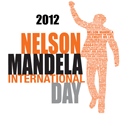 Mandela Day is an annual celebration of Nelson Mandela’s life and a global call to action for people to recognise their individual power to make an imprint and change the world around them.
Mandela Day is an annual celebration of Nelson Mandela’s life and a global call to action for people to recognise their individual power to make an imprint and change the world around them.
Your guide to Nelson Mandela International Day 2012
- Mandela Day 2012 international launch
- What is Mandela Day
- 67 Ideas
- Government events
- SA Governement News
- Photos
- Cabinet ministers wear Nelson Mandela T-shirts, 17 July 2012
- Videos
More about Nelson Mandela
- Nelson Mandela Foundation
- 46664.com
- Moral Regeneration Month
A global movement for positive change begins with small actions. As each person acts, they fuel momentum toward positive change, raising awareness and expanding the reach of Mr Mandela’s values – fighting injustice, helping people in need and practicing reconciliation.
From 2010, 18 July was declared by the United Nations General Assembly (UNGA) as Nelson Mandela International Day. This day also coincides with the icon’s birthday. The celebration of this international day recognises and gives credence to the former President’s commitment to human rights, conflict resolution and reconciliation.
Mandela Day was created to inspire people to embrace the values of democracy and contribute towards the ideals of ensuring a just and fair society.
- President Jacob Zuma first introduced the concept of Nelson Mandela Day in 2009, to motivate a nationwide campaign to get the public involved in charitable activities.
- In November 2009, the UNGA paid tribute to Mandela by adopting a resolution to make the international community aware of his humanitarian work.
- The campaign aims to showcase the work of the Nelson Mandela charitable organisations (Nelson Mandela Foundation, Nelson Mandela Children’s Fund and the Mandela Rhodes Foundation) and raise funds to support their continuing work.
- The Mandela Day Campaign message encourages people to use 67 minutes of their time to support a chosen charity or serve in their local community. The 67 minutes symbolically represent the number of years the former President fought for human rights and the abolition of apartheid.
This day recognises the icon’s leading role in and support for Africa's struggle for liberation and unity, and his outstanding contribution to the creation of a non-racial, non-sexist democratic South Africa.
- Mr Mandela became South Africa’s first democratically elected president in 1994. As a champion of reconciliation, he was instrumental in the Truth and Reconciliation Commission, which was set up by South Africa’s Government of National Unity to help deal with the atrocities of apartheid.
- Before his presidency, Mandela was heavily involved in anti-apartheid activities. He served 27 years in prison, many of which were spent with other sentenced freedom fighters.
- While officially retired, he continues to voice his opinion on topical humanitarian issues and campaigns globally for peace, children and the fight against HIV and AIDS.
- Government calls on all South Africans to contribute to the social and economic security of Africans, by living the values of our Constitution that provides for the rights of all people living in our country and the affirms democratic values of human dignity, equality and freedom for all.




